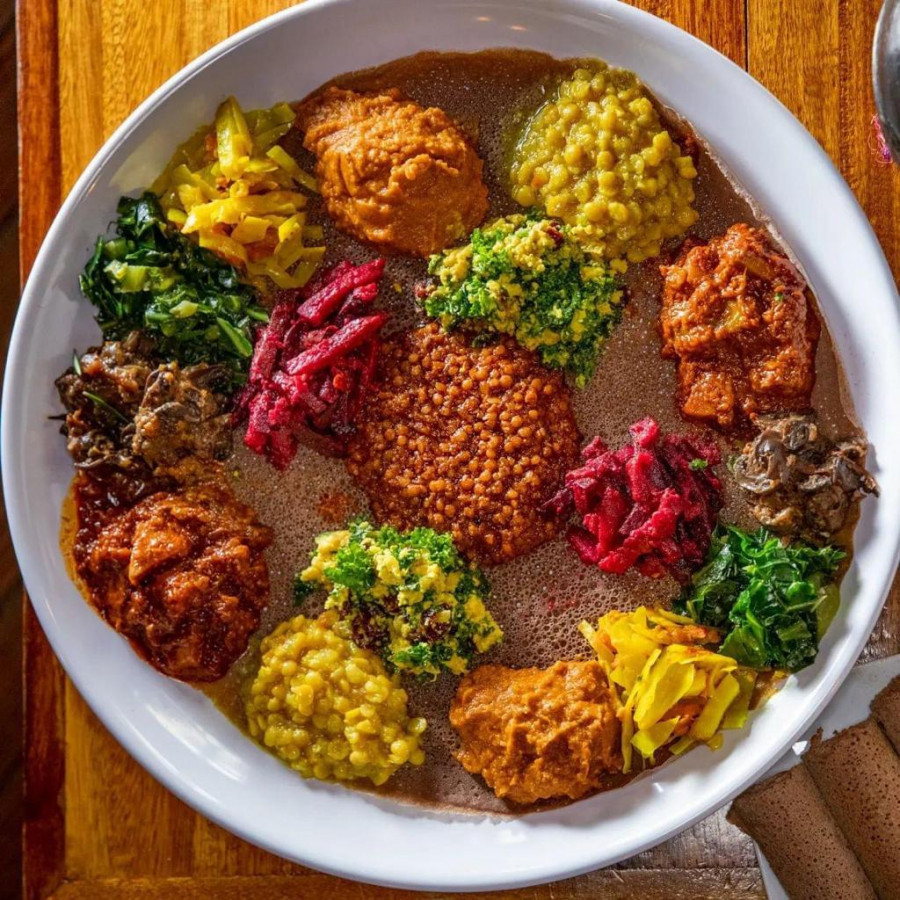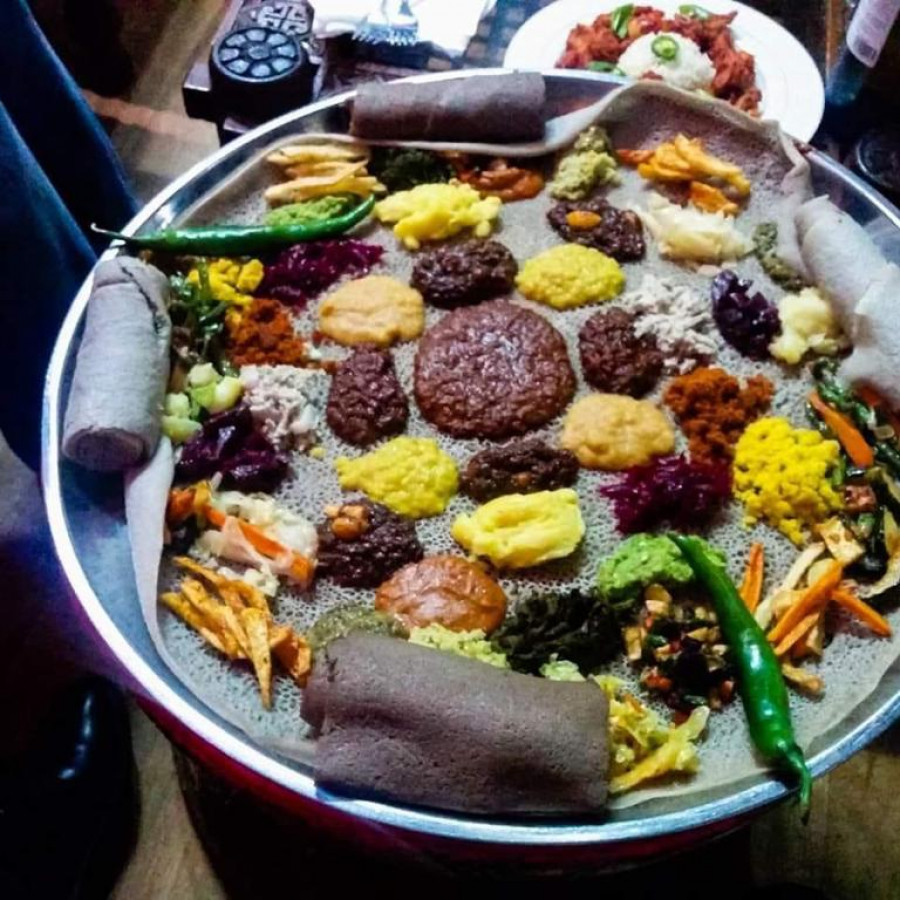Vistor Information
Ethiopian Cuisine
Ethiopia is a Home to the African Union, various United Nations departments, expats and foreign NGOs, Addis Ababa is very much an international city and visitors can enjoy all types of cuisine. Ethiopian food is distinctive and delicious, befitting a remarkable country with a cultural heritage that stands out from the rest of Africa. While the cuisine of Ethiopia is becoming better known, it still remains something of a secret.
Injera and Wot
Most Ethiopian dishes are served alongside injera. The staple food throughout Ethiopia is injera and wat. Injera is a large pancake-shaped bread, made from tef, a grain mixed with yeast and left to go sour for three days before being cooked on a hot clay board. Injera is normally served with a bowl of wat stew. Wat is a fiery hot sauce sometimes containing bits of meat, beans and lentils. Wat sauce is either red and very hot, flavoured with peppers (beriberi), onions and garlic, kai wat, or yellowish in colour and quite bland, alicha wat. If you’re a bit concerned about spicy foods, wat misto consists of half portions of kai and alicha wat.
What is the main dish in Ethiopia?
Often called the national dish of Ethiopia, the berbere-spiced chicken and egg stew is usually reserved by home cooks for occasions such as family gatherings, religious holidays, and weddings, in part because making doro wat can be very time-consuming.
Raw Meat! Tere Siga
Raw Meat is one of Ethiopia’s most popular delicacies is cubes of raw red meat. Two people typically order half a kilo of tere siga to share, which is eaten with injera or bread to clasp the meat you carve off the raw slab, and dipped in copious amounts of mitmita (red pepper spice blend).
One of the stories about how Ethiopians developed a love of raw meat is that it was developed as a military tactic during the 16th century so fighters could avoid detection by not having to start fires to cook their meat.
The land of coffee
Drinks and Wine
Over the past two years, Ethiopia has seen a boost in both local wine and beer production. The Acacia and Rift Valley wines are of the highest quality, and there are a dozen different Ethiopian beers. Ethiopia is perhaps most famous for its honey wine, known astej, which is available in many places across the country. Among other home brews, Ethiopian drink copious amounts of tela, a handmade ferment of grain and hops, and araki, a distilled liquor
Mealtime Etiquette
- Most traditional Ethiopian food is eaten with the hands; this is done by tearing off a piece of injera and using it to pick up a morsel of food.
- Traditional meals are eaten from a communal plate about the size of a pizza pan.
- Eat with your right hand - the left is considered unclean and therefore you should avoid using it if you can.
- Always wash your hands before and after the meal. Sometimes a server will bring a basin and pitcher of water with soap to the table.
- The gursha is a gesture when a person will carefully place a morsel of food directly into your mouth. It is a gesture of respect and friendship.
- Allow any elders to begin eating before you do. If you are the oldest present, Ethiopians will patiently wait until you begin to eat.






Health and Safety
Ethiopia is a safe and reasonably healthy country in Africa for foreigners, and violent crime against foreigners is almost unknown. However travelers store Passports, money and valuables precautions should be taken accordingly. Keep your passport with you at all times and do not leave it in your main luggage.
Remarkable Ethiopia Tours recommends all tour participants should consult their doctor 30 days before leaving.
All tour Visitors are encouraged to purchase personal travel insurance policy to cover against sickness, accident, loss of baggage, unexpected alterations to travel arrangements and travel disruption, emergency evacuation, cancellations, etc.
Visitors coming from certain place are required to have a Yellow Fever Vaccination Certificate to prove you have had the vaccine.
Certain area of Ethiopia have malaria, all visitor should consult their doctor before leaving as there are differing requirements on the type of prophylactic to be taken and the amount and frequency of tablet taking will depend on the type you take. It is normally advised that these medications be taken prior to entering a malarial area.
From medium to large towns have pharmacies, however as we will be a long way from medical care, it is essential that you are also prepared. And bring sufficient quantities of any specific medications you require.
Ethiopian Money and Foreign Exchange
- The local currency unit, the Ethiopian birr, which have notes of 200, 100, 50, 10, and 5 Birr, the cents are of 50, 25,10,5, and 1.
- The exchange rate is the same throughout the country. Exchanging currencies in banks are available, however, if you plan to change Ethiopian birr back to a foreign currency at the end of your tour, you should keep the receipt of your foreign currency exchange. The banks want to make sure you actually brought foreign currency into Ethiopia and will want to see the receipt as proof. For this reason, we suggest you only change funds that you are confident you will spend during your tour. If you later need more birr, banks are in all towns and cities.
- ATM machines are also widely available in Addis Ababa and are increasingly found in the larger towns.
- Credit cards are generally only accepted by Ethiopian Airlines, some travel agents, and at foreign hotels such as the Sheraton, Hilton, or Radisson Blu. You should not expect to use your credit cards at local restaurants or gift shops.


Ethiopian Visa Information
Nearly all visitors to Ethiopia require Visas.
- eVisa is an easy process and available to citizens of most countries. Check the link for all visa-related details and to apply for an online Visa. If you are not eligible for the eVisa or if you want a multiple entry visa you should apply directly to your nearest Ethiopian Embassy. Some of them are listed below
eVisa
Eligible visitors may apply for and receive their visas online. To see a list of eligible countries and other requirements, visit the eVisa website.

